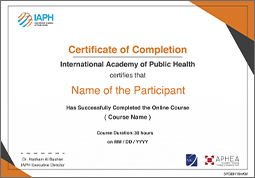Epidemiology of Mental Health Disorders
Description
Epidemiology of mental health disorders is the study of the distribution and determinants of mental health disorders among populations. Mental disorders represent four of the 10 leading causes of disability worldwide. This growing burden amounts to a huge cost to health care system in terms of human misery, disability and economic loss. This course examines mental health and mental disorders across the life span: child, adolescent, adult and older adult.
Trainees will learn about the major risk factors for and etiologic models of mental disorders. This will include examination of social factors, biological factors, genetic factors and their interactions. Special attention will be paid to the unique methodological and analytical issues highlighted by mental health epidemiologic research. Based on the concepts covered in this course, participants will consider the implications for public health programs and interventions.
Learning Outcomes
- Describe the epidemiology of mental health problems as they affect adults, adolescents and children
- Calculate the determinants, risk and protective factors for mental health at different stages in the life course
- Apply various assessment measures of mental health
- Critically evaluate the measures of mental disorders burden and their application from monitoring to policy evaluation
- Compare and contrast the range of approaches to mental health promotion and mental illness prevention
- Mental Disorders Concept and Classifications.
- Health Services For Mental Disorders.
- Mental Health and Mental Well-being: Definition and measurement.
- Mental Health and Mental Well-being: Social and Cultural Determinants.
- Mental Health and Mental Well-being: Family Influence On Mental Health.
- Mental Health and Mental Well-being: Environmental Influences and Mental Health.
- Mental Health and Mental Well-being: Economics of the mental health.
- Mental Health Assessment and Screening Tools.
- Well-being measurement in community surveys.
- Mental Health in Children and Adolescents.
- Mental Health and Aging.
- Parenting and Family-Focused Support.
- Prevention and Mental Health Promotion.
- School Based Mental Health Services Session.
- Workplace Wellbeing.
- Community Health Approaches.
- Integrating Mental Health Care with Primary Health Care.


Certificate
